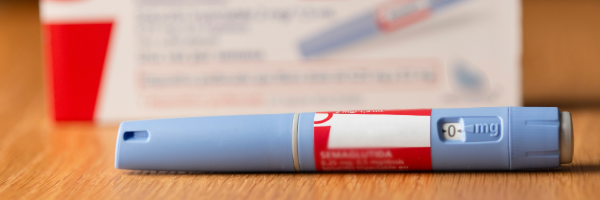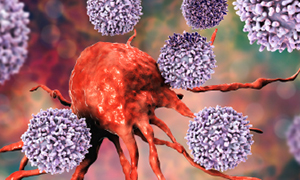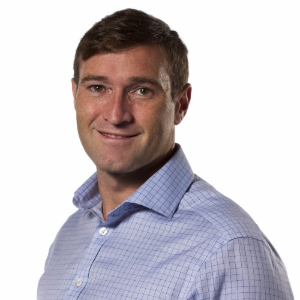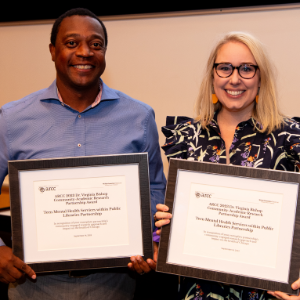
MARCH 2024 NEWSLETTER
The newsletter of the Feinberg School of Medicine Research Office
 |
Treating Cardiovascular Health with Anti-Obesity Medications and Addressing Health Equity |
|
As medications like semaglutide have been shown to be effective at helping patients lose weight, scientists are asking, can they treat other conditions where obesity is a risk factor? Most recently, studies have started to show that they can reduce the risk of cardiovascular disease by reducing overall body weight. Because more than half of the world’s population is projected to have obesity or be overweight by 2035, these drugs could improve health, reduce healthcare costs and improve quality of life for people living with obesity and subsequent medical complications like heart failure. |
 |
Feinberg Faculty Inducted into American Society for Clinical Investigation |
|
Four Feinberg faculty members have been inducted into the American Society for Clinical Investigation (ASCI). This year’s ASCI inductees include Amani Fawzi, MD, the Cyrus Tang and Lee Jampol Professor of Ophthalmology; Craig Horbinski, MD, PhD, director of Neuropathology in the Department of Pathology; Sanjiv Shah, ’00 MD, the Neil J. Stone, MD, Professor of Medicine in the Division of Cardiology; and Benjamin Singer, ’07 MD, ’10 GME, the Lawrence Hicks Professor of Pulmonary Medicine. |
 |
The Role of AI in Scholarly Communications: Ensuring Best Practices |
| Artificial Intelligence (AI) tools have rapidly gained prominence in various fields for scholarly communications. A 2023 Nature news article reported that over 30 percent of the 1,600 surveyed investigators relied on chatbots and LLMs for various tasks such as manuscript writing. Read the latest best practices and ethical considerations on using AI in scholarly work. |
Faculty ProfileUsing AI and Precision Rehabilitation Interventions to Measure and Improve Patient FunctionR. James Cotton, MD, PhD, ’20 GME, is assistant professor of Physical Medicine and Rehabilitation. He is a physician-scientist, with appointments at Feinberg and the Shirley Ryan AbilityLab. His research combines AI, wearable sensors, computer vision, causal and biomechanical modeling and novel technologies to develop novel methods that more precisely monitor and improve rehabilitation outcomes. |

|
Staff ProfileSupporting Research Infrastructure at FeinbergPhilip Silberman is the manager of research analytics at Feinberg. In his current role, Silberman supports a broad variety of research projects and streamlining clinical data monitoring and use. |

|
Student ProfileExploring the Brain with Functional Magnetic Resonance ImagingJoseph Salvo is a PhD student in Northwestern University’s Interdepartmental Neuroscience (NUIN) program. He works in the aboratory of Rodrigo M Braga, PhD, where he now uses MRI brain mapping to investigate the parts of the brain involved in reading. |

|
Campus Events |
||||||||
|
Research in the NewsTODAY, February 26 New York Times, February 27 Chicago Tribune, March 1 |
NUCATS CornerWhy Use NUCATS to Place an Ad on the CTA?Thanks to a longstanding vendor relationship, NUCATS has negotiated special discounted rates (up to 50% off) for Chicago Transit Authority advertisements. The NUCATS communications team provides research groups guidance through the ad process, an internal ad review to help increase participant interest, and timely execution of the ad campaign. Learn more by searching “CTA Ad” in the NUCATS Research Resource Directory. |

|
Sponsored ResearchTitle: Reach Out 2: Randomized Clinical Trial of Emergency Department-Initiated Hypertension Mobile Health Intervention Connecting Multiple Health Systems
|

|
Sponsored ResearchTitle: Role of epoxy fatty acids - soluble epoxide hydrolase axis in intestinal mucosal barrier defense
|

|
Breakthroughs PodcastPartnering with Libraries to Address Teen Mental Health with Ashley Knapp, PhD, and Robert Simmons, MAIn this episode, Knapp, assistant professor of Psychiatry and Behavioral Sciences, and Simmons, director of social services and public safety at Oak Park Public Library, discuss an innovative community partnership between Northwestern Medicine investigators and a Chicagoland library and how it could be a model for future health interventions. |

|
New FacultyAbigail Smith, PhD, joined Feinberg on August 1, 2023 as associate professor of Preventive Medicine in the Division of Biostatistics. She has experience with the design and execution of multi-center observational cohort studies. As a member of the Northwestern University Data Analysis and Coordinating Center (NUDACC), Dr. Smith provides project leadership and statistical expertise to multi-center research consortia including development of common protocols and associated electronic data capture systems, data management and quality control, statistical analysis planning and execution, and data dissemination. She was previously at Arbor Research Collaborative for Health, where she served as Scientific and Data Coordinating Center Program Scientific Director. |

|
High Impact ResearchAbramson JS, Palomba ML, Gordon LI, Lunning M, Wang M, Arnason J, Purev E, Maloney DG, Andreadis C, Sehgal A, Solomon SR, Ghosh N, Dehner C, Kim Y, Ogasawara K, Kostic A, Siddiqi T. Two-year follow-up of lisocabtagene maraleucel in relapsed or refractory large B-cell lymphoma in TRANSCEND NHL 001. 2024; 143(5):404-416. Albers GW, Jumaa M, Purdon B, Zaidi SF, Streib C, Shuaib A, Sangha N, Kim M, Froehler MT, Schwartz NE, Clark WM, Kircher CE, Yang M, Massaro L, Lu XY, Rippon GA, Broderick JP, Butcher K, Lansberg MG, Liebeskind DS, Nouh A, Schwamm LH, Campbell BCV. Tenecteplase for Stroke at 4.5 to 24 Hours with Perfusion-Imaging Selection. New England Journal of Medicine. 2024; 390(8):701-711. Awad LN, Jayaraman A, Nolan KJ, Lewek MD, Bonato P, Newman M, Putrino D, Raghavan P, Pohlig RT, Harris BA, Parker DA, Taylor SR. Efficacy and safety of using auditory-motor entrainment to improve walking after stroke: a multi-site randomized controlled trial of InTandem. Nature Communications. 2024; 15(1):1081-1081. Bhat RV, Young G, Sharathkumar AA. How I treat pediatric venous thromboembolism in the DOAC era. Blood. 2024; 143(5):389-403. |
Featured CoreMicrosurgery and Preclinical Research CoreThe Microsurgery and Preclinical Research Core of the Comprehensive Transplant Center provides high-quality microsurgical services to support all principal investigators in need of small animal surgical models and offer consultations on any issues pertaining to microsurgical techniques in small animal models. The core develops novel animal models that may complement ongoing studies or help investigators explore novel ways to test their hypotheses in vivo. The Microsurgery and Preclinical Research Core facility has two surgical stations for the performance of microscopic animal surgery. It is staffed by four experienced surgeons who have successfully performed rodent procedures, including heart, kidney, liver, intestine, ovary and pancreas transplantation, as well as skin grafting and ileocecal resection. View the current facility price list for microsurgery procedures. To read additional information about this core, download the brochure. |
NIH NewsFY 2023 By the Numbers: Extramural Grant Investments in Research In 2023, NIH spent $34.9 billion of their total $47.7 billion appropriation for competing and non-competing grant awards. This is a 4.7% increase in spending over the previous year. NIH supported 58,951 competing and non-competing awards in FY 2023. The success rate for new research project grants increased 0.6 percentage points from 20.7% in FY 2022 to 21.3% in FY 2023. NIH launches research network to evaluate emerging cancer screening technologies The NIH has launched a clinical trials network to evaluate emerging technologies for cancer screening. Eight groups have received funding from the National Cancer Institute (NCI), part of NIH, to carry out the initial activities of the network. “There are many cancers we still cannot reliably detect until it is so late that they become extremely difficult to treat,” said W. Kimryn Rathmell, MD, PhD, director of NCI. “Emerging technologies such as multi-cancer detection tests could transform cancer screening and help to extend the lives of many more people. We need to be sure that these technologies work and understand how to use them so they benefit everyone.” Studies are needed, for example, to evaluate the benefits and harms of promising new technologies for cancer screening and to determine how best to incorporate these technologies into the standard of care. |
Funding OpportunitiesUnderstanding Chronic Conditions Understudied Among Women (R01 Clinical Trial Optional)
|
Thank You For ReadingThis is our new Breakthroughs format, and we welcome your feedback. Please share it with us via email. |
|
|
